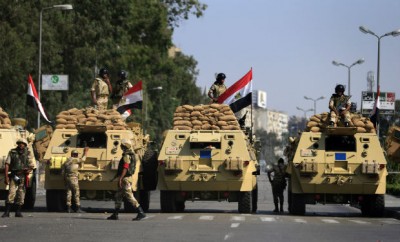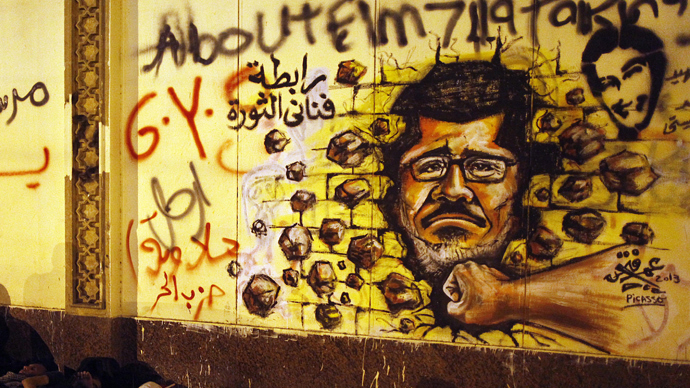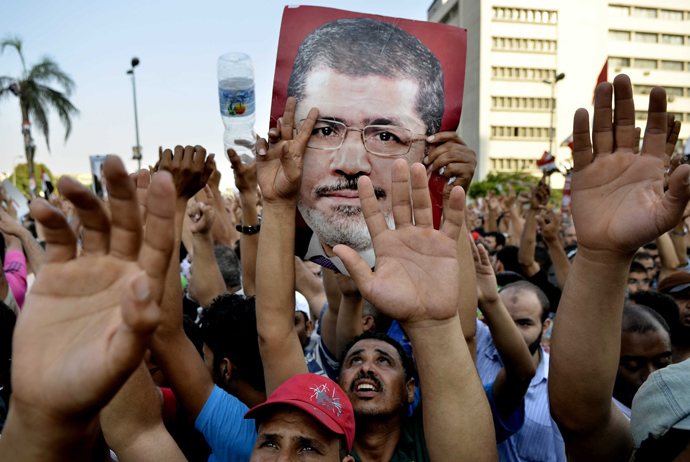America and the Generals in Egypt moved against Morsi to prevent a Popular Revolution

The Egyptian military’s removal of the Muslim Brotherhood government is seen as a military coup, or an acknowledgment of the people’s demands to remove Morsi, but it also could have been a move to pre-empt a civil war from taking place.
What should be emphasized about the Egyptian military is that its leadership is Egypt’s top economic actor, no friend of democracy, and the most reliable partner of the US and Israel inside Egypt.
There is another factor that is to be considered. If not delayed until 2014, the coup came a few months before delayed parliamentary elections that could have taken place in October or November 2013. If the protests in the streets amounted to a majority at the ballot box, the opposition could have had Morsi constitutionally and legally removed from power through a parliamentary vote leading to a general plebiscite.
For both the Muslim Brotherhood’s supporters and opponents, at least at the grassroots level, America is the common denominator in their struggle. Morsi’s supporters and opponents alike are both accusing one another of complying with US plots against Egypt. The Muslim Brotherhood’s supporters say that the US had Morsi removed from power whereas Morsi’s opponents say he was a US puppet that Washington was trying to keep in power. Both are actually right.
There is one important angle that is being missed when the events in Egypt are being debated. The Egyptian military removed Morsi to pre-empt a popular revolution from taking place. The Obama administration gave the green light to remove Morsi as a means of preventing the Egyptian people from taking things into their own hands.

.
The Muslim Brotherhood-Obama alliance
Many have accused the Muslim Brotherhood of being an American asset. Asset could mean many things and depends on what is specifically being implied by the use of the word. If asset means an actor that has no agency and is unable to make independent decisions, the Muslim Brotherhood is not categorically a US asset. Yet, the Muslim Brotherhood is not the pristine organization with clean hands that many of its supporters think it is. It is definitely a US asset, if by asset it is being implied that the Muslim Brotherhood has served US interests.

–
What is important to note is that the United States and Muslim Brotherhood have both tried to manipulate one another on the basis of their own converging agendas. Collaboration between the US government and Muslim Brotherhood goes back to the time of Gamal Abdel Nasser when they both worked against Nasser’s government. The particular arrangement between the Muslim Brotherhood and the US over the Arab Spring, which has seen the Muslim Brotherhood riding the 2011 wave of Arab upheavals into power, goes back to President Obama’s 2009 “A New Beginning” speech that was supposed to reset America’s damaged relations with the world’s Muslims. The Obama administration specifically asked that representatives of the Muslim Brotherhood be present when President Obama delivered the widely anticipated speech in Cairo.
As a regional player, the Muslim Brotherhood tried to use the Obama administration as much as it could in its ascent to power in Egypt and the broader Middle East and North Africa. In fact, the Muslim Brotherhood in many circumstances would have found it nearly impossible to act on its own if it were not for the support of the Obama administration and its regional allies, like Qatar and Turkey. On the other hand, the Obama administration has used the Muslim Brotherhood in its regional strategy against Iran and all the other regional players opposing the US and Israel. In this regard, the Muslim Brotherhood has served Washington in its war against the Syrians and Libyans and as a means to slowly nudge the Hamas government in Gaza away from the orbit of Iran and the Iranian-led Resistance Bloc that includes Syria and Hezbollah. The Muslim Brotherhood has also continued to support Israel by blockading Gaza and collaborating against the Palestinians in the military and security sectors.

.
The military coup pre-empted a real revolution
Swept away with romanticized notions, many people have been slow to realize that the Muslim Brotherhood government in Egypt was a neo-liberal regime. To put it candidly, the Muslim Brotherhood has represented a democratized continuation of the old regime of Hosni Mubarak in its policies and actions. Most Egyptian state institutions maintained old regime figures and even Morsi’s cabinet included more members of the old regime of Mubarak than Muslim Brotherhood politicians from the Freedom and Justice Party.
Despite the fact that the Muslim Brotherhood and the Egyptian military formed an uneasy US-brokered alliance, the one snag in America’s plans has been that inside Egypt there has been a power struggle. Be it members of the old regime or authentic democrats, there has been a reluctance by a large segment of the population to accept the Muslim Brotherhood’s rule that has polarized Egyptian society. At the same time, the Obama administration has capitalized on these cleavages as a means of trying to position itself as the arbitrator of power in Egypt.
The Obama administration supported the Morsi administration, but it betrayed him by quietly supporting the military coup. Washington did this to prevent what it feared could have led to a popular uprising and revolution in Egypt that would have overthrown Morsi. Because an authentic people’s revolution would have unpredictable results that would not safeguard their interests, both the US government and Egyptian military feared this. Specifically, Washington and the Egyptian military’s leadership could both face the potential risk of seeing the empowerment of a revolutionary government in Cairo that would be outside of their control or influence. The Egyptian military’s leaders could have lost their wealth and businesses, while America would have lost control of the largest Arab country and the Suez Canal. This is why the military acted against the Muslim Brotherhood.
The Obama administration has made a huge mistake in Egypt. Maybe it will engineer a civil war to prevent the inevitable. America, however, will eventually lose Egypt.
This article was originally published by RT Op-Edge.

